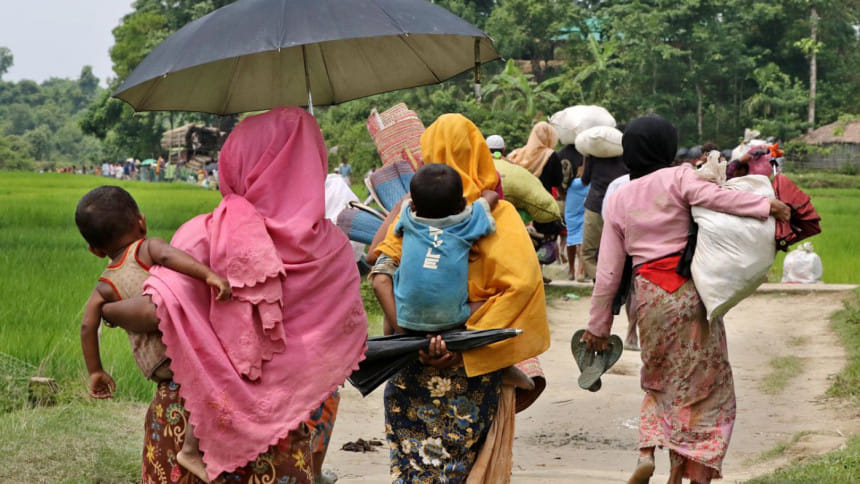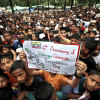Where is our Rohingya Policy?

What we have today in the Rakhine State of Myanmar is a regime of ethnic cleansing. This latest round of pogrom of the Rohingyas is the result of the international community's abject lack of action. Not only has the persecution of the Rohingyas not stopped, there has been a renewed vigour in the activity of the state agencies of Myanmar to ensure that the State of Rakhine is emptied of the Rohingyas.
And the rest of the world, apart from some episodic comments from the United Nations, has done nothing palpable to restrain the wanton persecution by the State of Myanmar of one of its ethnic minorities, while Bangladesh has had to bear the burden for the last three decades.
It is now clear that the formation of the Annan Commission by Su Kyi was merely a ploy. It is not difficult to see through her trick to show to the world that she was alive to the situation in Rakhine State and wanted a resolution of the problem. She had no intention of implementing any of the Commission's recommendations. Apparently, Myanmar is working on the basis of a long-vision policy on Rohingya. Do we have a Rohingya or indeed a Myanmar policy?
My query is triggered by the way we have handled the Rohingya issue so far. At best we have been reactive, at worst we have botched it up being caught up in the mesh of our own ad hoc reaction to evolving situations in Rakhine State. This reconfirms the fundamental folly in our foreign policy, if there is one at all, vis a vis Myanmar. For all too long we have taken our only other neighbour for granted. Our energy and indeed preoccupation was fixated on the larger and the more overwhelming neighbour. It is time we seriously addressed the Rohingya issue and revisited the conduct of our policy with Myanmar. But first let us look our handling of the recent Rohingya crisis since 2012, and the likely consequences.
We have resolutely refused to accept officially the persecuted Rohingyas as refugees and have tried to prevent their entry into Bangladesh with little success. Where possible we have pushed them back, into the fire literally.
In 2012 the Rohingyas were technically not refugees according to the definitions of the international covenant on the matter. Since they did not then face any state persecution, a requirement to qualify as a refugee, as we were made to believe by official sources in Myanmar, they could not seek sanctuary in another country. We were told it was an ethnic matter of Myanmar. But commenting on the matter in 2012 we had warned that, "by refusing to accept the Rohingyas, we have given the wrong signal to Myanmar. It would leave the Rohingyas at the mercy of the majority and would literally have to choose between the devil and the deep sea." That is exactly what the Rohingyas are faced with at this very moment.
Our handling of the Rohingya influx now is in sharp contrast to the way Bangladesh handled it in 1998. We had then allowed the nearly 300,000 refugees in and registered them. But we eventually made Myanmar take them back. Bangladesh must have done something right surely in its stance on the matter that had persuaded Myanmar to take back most of the Rohingya refugees. Why can't that stance be replicated now?
The reality is that the Rohingyas are victims of state terrorism. And there are benefits of registering the Rohingyas even if we are unwilling to acknowledge them as refugees. For one thing we can have a tab on the exact number that have entered the country. As of now, in spite of our declared intention of not allowing in the Rohingyas, a large number of them have entered Bangladesh. The figures varies between 90,000 and 150,000. And most of them have settled well inside our territory and many have merged with the locals. Has our current stance helped in effectively addressing the matter?
And that is what begs the question. If registered as refugees the Rohingyas could be sequestered, their movement controlled, and provided relief under supervision of international aid agencies. And we could project an accurate picture of both the number and plight of the Rohingyas. Not having them registered provides Myanmar with a bargaining chip. It will refuse to accept the unregistered Rohingyas when the situation improves enough for the Rohingyas to go back on the grounds that they were not Rohingyas but locals and we were passing them off as Rohingyas to inflate the number of Rohingyas in Rakhine state.
Turning them back has another very dangerous potential, apart from sending them back to face more persecution. The younger ones among them would be provoked to join the ranks of the extremists, as some of them already have, to provide their own protection against the Myanmar forces.
The diplomatic front needs to be geared up more. The plight of the Rohingyas and the impact of that on Bangladesh is not very well known to the outside world. One is not aware of any coherent strategy to handle the Rohingya issue. There must be constant diplomatic effort in this regard and not episodic, waking up when there is an influx from Myanmar. The underlying issue—citizenship of Rohingyas—is a settled issue unsettled by Ne Win in 1982 with an extremely narrow chauvinistic motive. This something that our friends must be made to understand.
Regrettably, the role of Myanmar's two close neighbours, have been disappointing. India and China are the countries who can and should bring to bear pressure on Myanmar. And that is the reason that has given the sense of impunity to Myanmar. So far India has been absolutely quiet on the issue, belying its much vaunted principled stand on human rights. Not surprisingly, the BJP's ideologue sees the Rohingyas as bunch of terrorists. China, although expressing its willingness to help us in resolving the Rohingya issue, has, along with Russia, either blocked issuing of a statement by UN or vetoed draft UN Resolutions on Myanmar since 2007. What have we done to put our case to these three, who happen to be our very good friends too?
We understand that there is a National Task Force on Rohingya. We would like to think that the TF has formulated a policy to proceed on in handling the issue, if not then one should be made immediately.
The Rohingya issue is more complex, and impacts our national interest in more ways than we want to acknowledge. And we cannot play it by ears. A Myanmar policy, with a corollary Rohingya policy, must be devised immediately. Its consequences on the region and certainly on Bangladesh, if allowed to simmer is imponderable.
The writer is Associate Editor, The Daily Star.










Comments